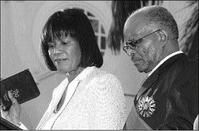Hartley Neita, Contributor
Governor General, Professor Kenneth Hall (right), conducts the swearing-in of Prime Minister Portia Simpson Miller at King's House on March 30, 2006. - File Photo
In the period before the advent of Universal Adult Suffrage in Jamaica, 60-odd years ago, the governors, who were our heads of government, were sworn in by the officer in charge of the British regiment stationed in Jamaica.
Those governors remained ourchief executives until 1962 when we attained Independence. In 1944, when the Jamaica Labour Party won the election, its leader, Alexander Bustamante, was named the Leader of the Majority Party. In subsequent years, the head of the political party which won the election became Chief Minister and later Premier, and they were sworn in to these offices by the Governor at King's House in private ceremonies.
When we became independent on August 6, 1962, then Governor, Sir Kenneth Blackburne, was appointed Governor-General, and his was also a private ceremony. Later in the day, he swore in Sir Alexander Bustamante at King's House in what was also a private ceremony.
first J'can-born G-G
The first public swearing-in ceremony of a Jamaican head of state took place three months later at the National Stadium when Sir Clifford Campbell became the first Jamaican-born Governor-General. This was the first visible evidence of the change in Jamaica's constitutional status from being a subject colony of Britain to an independent nation.
The stadium was packed. The covered section to the west saw members of the Cabinet, Leader of the Opposition, Members of Parliament, diplomats, senior public officials, the Mayor of Kingston and chairmen of the parish councils, councillors, leaders of the private sector, representatives of the commodity associations, and other leading citizens. Other citizens crowded the bleachers.
The family of Sir Clifford and Lady Alice arrived shortly before the ceremony began, and were escorted to the Royal Box. They were hardly seated when a spotlight brightened the entrance of the marathon tunnel and entering, were smartly dressed police outriders leading the official car of the Head of State. This was an Austin Princess, with the cover over its rear seat open, and blazoned in the spotlight were Sir Clifford, wearing the plumed helmet of the Head of State, and seated beside him was Lady Alice.
There was a gasp. For years, Jamaicans had identified the Austin Princess with our British governors. Now, sitting proudly in it and being driven by a police officer, was a black man wearing the uniform of his predecessors in office. The car, flying the new Governor-General's flag designed by civil servant and graphic artist Franklin Bernal, drove slowly, anti-clockwise on the cycle track of the stadium. Group by group stood and began applauding until it reached a crescendo when the car stopped at the main entrance of the stadium. There, waiting for the Jamaican Governor-General and saluting him were the chief of staff and commissioner of police.
symbolic beginning
Up to the day before, they were saluting a white British Governor-General. It was the symbolic beginning of the realisation that Jamaicans were now masters in their own yard.
Five years later, there was another swearing-in ceremony. This time, it was for Jamaica's second Prime Minister, Donald Sangster. He chose that his should be private, and the only witnesses were the Governor-General's secretary, Neville Smith, his A.D.C., Captain Bert Chung, Sangster's press secretary (this writer) and a photographer, Aston Rhoden.
Six weeks later, Sangster died. Once again, there was a swearing-in ceremony, of Hugh Shearer as Prime Minister, the witnesses of which were members of his new Cabinet.
Shearer was succeeded in 1972 by Michael Manley. He came to office floating on a wave of public euphoria. No way could his swearing-in be a private ceremony behind the walls of King's House. Thousands were invited and witnessed this ceremony, which took place on the eastern lawn of the Governor-General's residence.
public ceremonies
Sir Clifford Campbell retired from public life in 1981 and was succeeded by Florizel Glasspole. At first, he did not want a public ceremony, but Manley persuaded him to change his mind. That tradition has continued.
Manley was sworn in again at a public ceremony in 1976.
Edward Seaga also rode the waves of public acclaim in 1980 and his swearing-in was also at King's House. It was the same in 1983, but by 1989, his politicalfortunes had changed. His party was defeated at the polls and he was succeeded by Michael Manley. Once again, he was sworn in at a public ceremony.
One year later, Glasspole retired and was succeeded by Howard Cooke. He, too, was sworn in at a public ceremony.
P.J. Patterson succeeded Manley as Prime Minister a few short years later, and again his swearing-in was pubic.
Up until then, the Prime Ministers swore their allegiance to Her Majesty the Queen and her heirs in perpetuity. In fact, this oath dipped Michael Manley in a bath pan of boiling water when he expressed the view that every time he swore it, he found it repugnant (my words), wishing instead that he could be swearing loyalty to the people of Jamaica. The royalists almost 'nyamed' him raw.
Two elections later, the oath was changed and Patterson and his successor, Simpson Miller, swore their loyalty to the people of Jamaica.
And so, too, will Bruce Golding.

